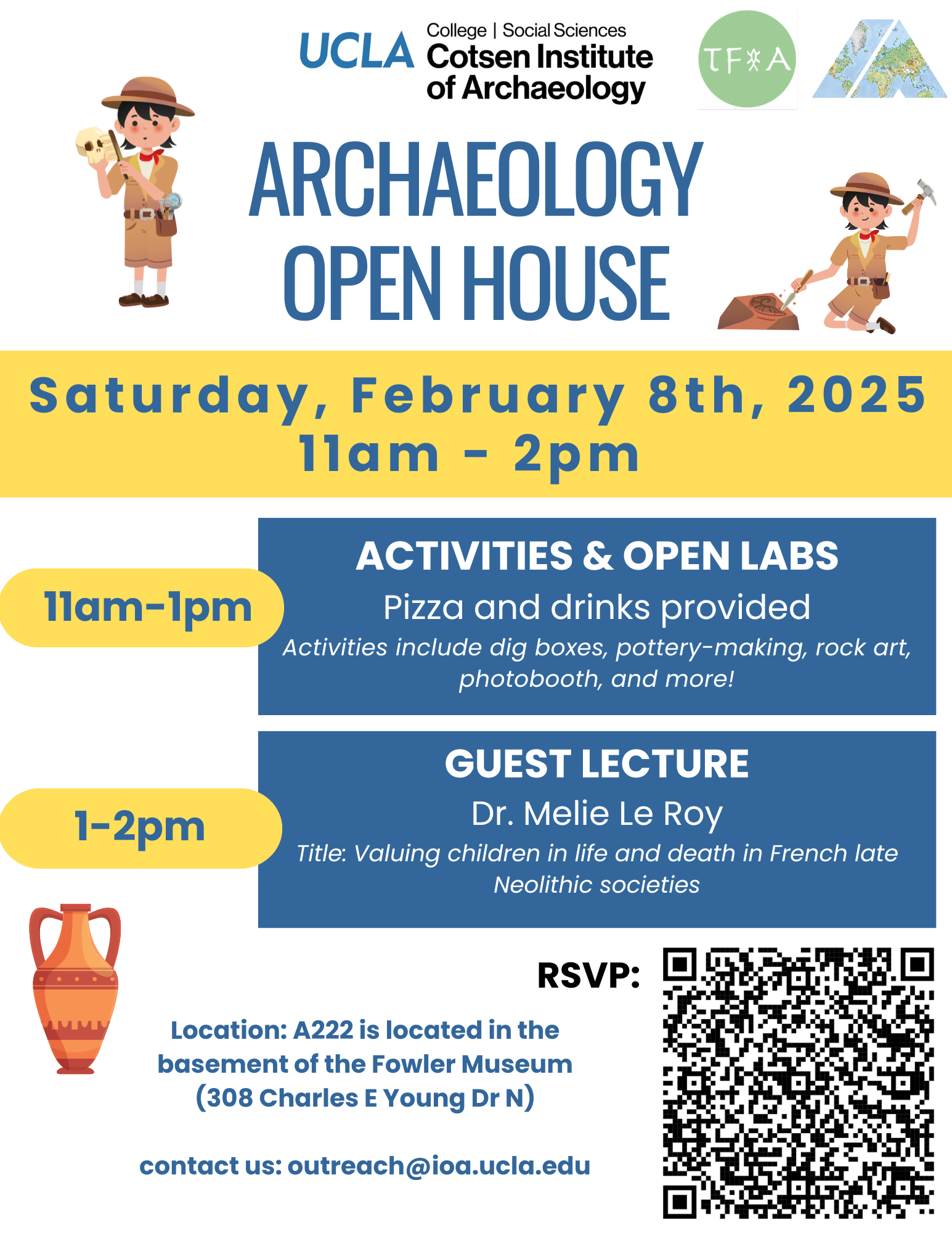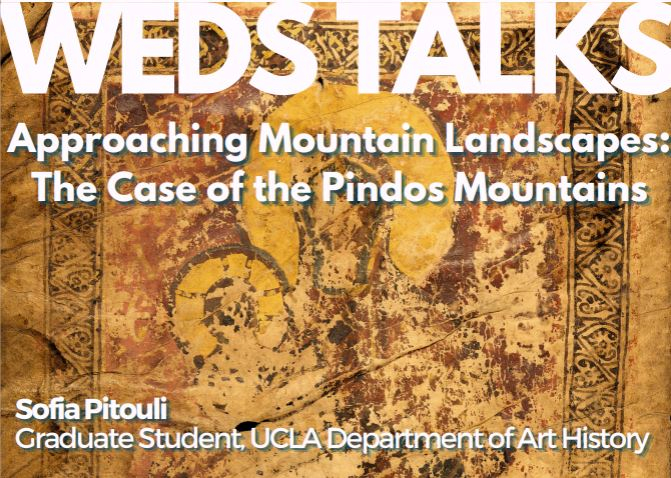Past Events
Interested in Cotsen events? Sign up for our mailing list.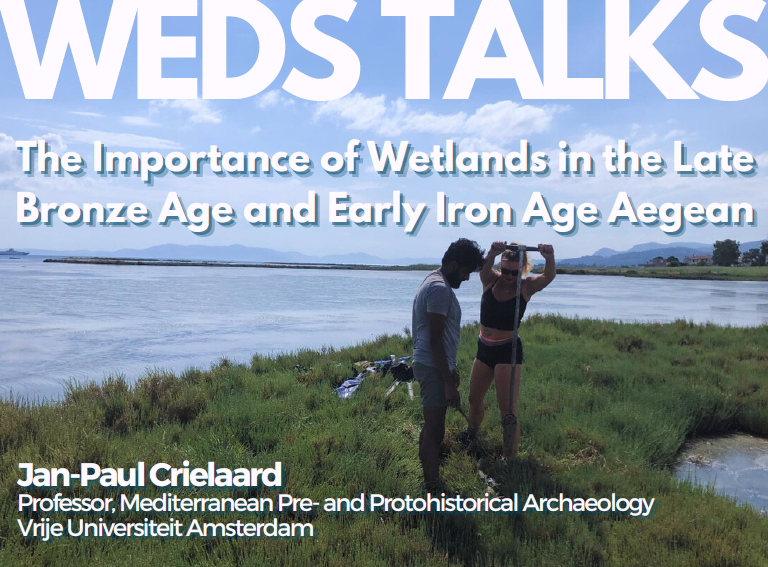
ABSTRACT: During the final stages of the Late Bronze Age, a shift in habitation towards coastal locations can be observed in several regions within the Aegean. Palaeoclimatic, sedimentological, and palynological data show that this shift includes settlement in or near marshy areas and wetlands. An assessment is made of the living conditions, as well as the advantages and disadvantages of inhabiting watery landscapes, using (bio)archaeological data and references from the Homeric epics. These findings help to shed new light on specific specimens of Late Geometric pottery, which appear to feature examples of wetland iconography.
BIO: Jan Paul Crielaard research focuses on the Early Iron Age and Archaic period, often combining written and archaeological information. He has published extensively on such topics as interconnections and culture contacts within the Mediterranean, Greek colonization, elites and elite behaviour, ethnicity, and archaeology and the Homeric epics. He has been involved in fieldwork in Greece, Cyprus, Turkey and Italy, and has been the co-director of the L’Amastuola field project in Puglia, Italy, and since 2010 directs the Plakari Archaeological Project in Karystos, and the Southern Euboia Sea and Land Routes Projects, both on the island of Euboia, Greece.
Contact Sumiji Takahashi
Email sutakahashi@ioa.ucla.edu
Phone 310-825-4169
This event has reached full capacity and is no longer accepting reservations - please email outreach@ioa.ucla.edu for information about future events.
Open House for K-12 students
Visit the labs, participate in a variety of activities including dig boxes, pottery-making, rock art, photobooth, and more!
Contact Victoria Newhall
Email outreach@ioa.ucla.edu
Phone
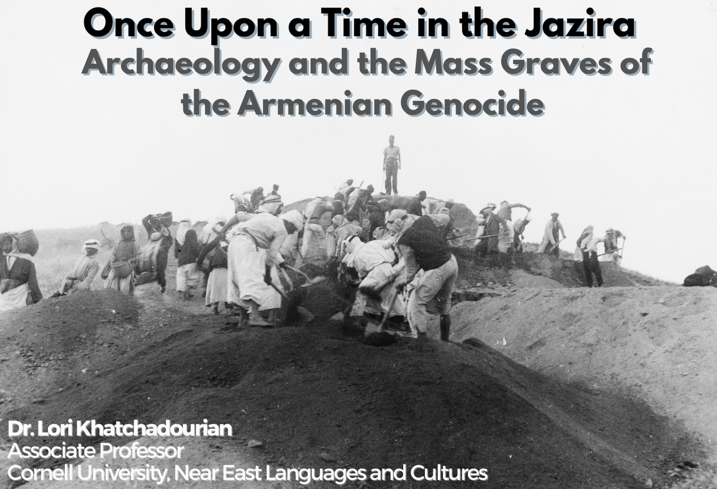
ABSTRACT: For the dead, and for the wretched who lived to give testimony to the Armenian Genocide, the Jazira region of northeastern Syria was hell on earth, its arid expanse and biblical rivers bloated with bodies and bones—the victims of Ottoman deportations and massacres. But for archaeology, which Laurent Olivier has dubbed the “consummate once-upon-a-time discipline”, the Jazira has been more akin to an Eden, brimming with vestiges of the deep past. This talk explores the practice of archaeology in this necrogeography. I disclose and diagnose how, for nearly a century, archaeology has remained virtually silent on the mass graves of the Jazira. Analysis centers on the mound of Tell Fekheriye, where several teams have uncovered and disregarded skeletal remains from the 1915-1916 massacres ever since the University of Chicago launched excavations in 1940. Among the world’s first mass grave exhumations, the Chicago project produced a collection of photographs, long buried in the archive. As archaeologists ignored the dark record of modernity in northern Syria, there emerged a parallel engagement with traces that I call survivor archaeology, a vernacular practice undertaken by genocide survivors and descendants to reckon with the memory of atrocity through the excavation, collecting, memorialization, and circulation of bones.
BIO: Trained as an archaeologist, Dr. Katchadourian's research spans the fields of archaeology, social anthropology, and critical heritage studies, with a particular focus on Armenia, the South Caucasus, and neighboring regions. Her work explore problems of empire, materiality, the archaeology of modernity, Soviet socialism and its aftermath, and the politics of heritage. Her research and teaching are temporally expansive, extending from the deep past to the present, and attentive to the ways in which the materiality of the past shapes contemporary politics, economics, and ethics. She pursue these concerns using the methods of archaeology, ethnography, spatial analysis, and archival research.
Contact Sumiji Takahashi
Phone
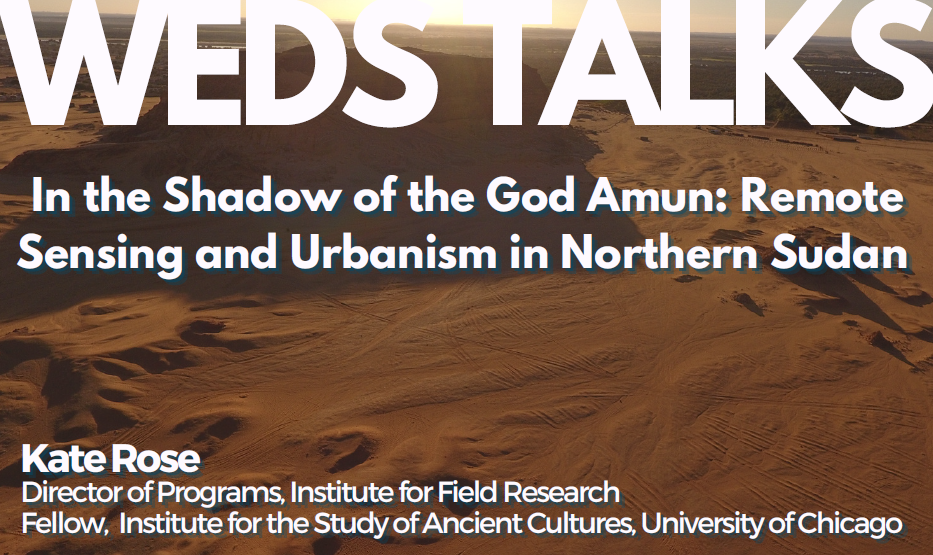
ABSTRACT: This presentation investigates urbanism and settlement patterns through multiple lines of remote sensing data in Northern Sudan. The site of Jebel Barkal, located 400 km from Khartoum, near the Nile, is known for its elite palaces, temples, and pyramids. The site served as the royal capital of Kush from the 8th century BCE and remained a major urban and religious center throughout the Meroitic Period. Recently a Meroitic settlement was identified, known as the “East Mound.” Since 2018 the Jebel Barkal Archaeological Project, in collaboration with the National Corporation for Antiquities and Museums of Sudan, has been excavating and surveying areas of the East Mound. This talk will present preliminary results of a new project aimed at analyzing LiDAR and thermal imagery data. The LiDAR and the thermal imagery extend beyond the East Mound into the modern dense and lush agricultural fields adjacent to the Nile. The data will allow us to more accurately map the settlement’s spatial extent and situate it within its broader landscape context. Objectives also include identifying any previously undocumented features such as architecture, activity areas, and paleochannels. This work contributes to our understanding of how major Kushite cities grow, evolve, and respond to environmental factors throughout their life histories. Lastly, this project ruminates on the impact of archaeological inquiry in Sudan, which is currently experiencing a civil war after years of political unrest, while centering Sudanese voices and local archaeologists.
BIO: Kate Rose is an anthropological archaeologist, specializing in landscape analysis and ancient urbanism in the Near East and North Africa. Her PhD dissertation at Harvard University is a comparative spatial analysis of Kushite royal cemeteries in Northern Sudan. As a researcher with the ERC DiverseNile Project at Ludwig-Maximilians-Universität in Munich, Germany from 2022 to 2024, she investigated landscape changes during the Bronze Age borderspace of the Attab to Ferka region. She has also held numerous lectureships and teaching positions at Harvard University and Boston University, and is interested in the intersection of pedagogy and fieldwork. She has served in various leadership positions on projects in Sudan, Egypt, Jordan, Turkey, and Spain. She is currently the Director of Programs at the Institute for Field Research, and a Fellow with the Center for Ancient Middle Eastern Landscapes at the Institute for the Study of Ancient Cultures, University of Chicago.
Contact Sumiji Takahashi
Email sutakahashi@ioa.ucla.edu
Phone 310-825-4169
The Andean Working Group presents "Beyond the Horizon: Pericentric Complexity in the Chavín Phenomenon at Atalla, Peru" by Dr. Michelle Young, Assistant Professor in the Department of Anthropology at Vanderbilt University.
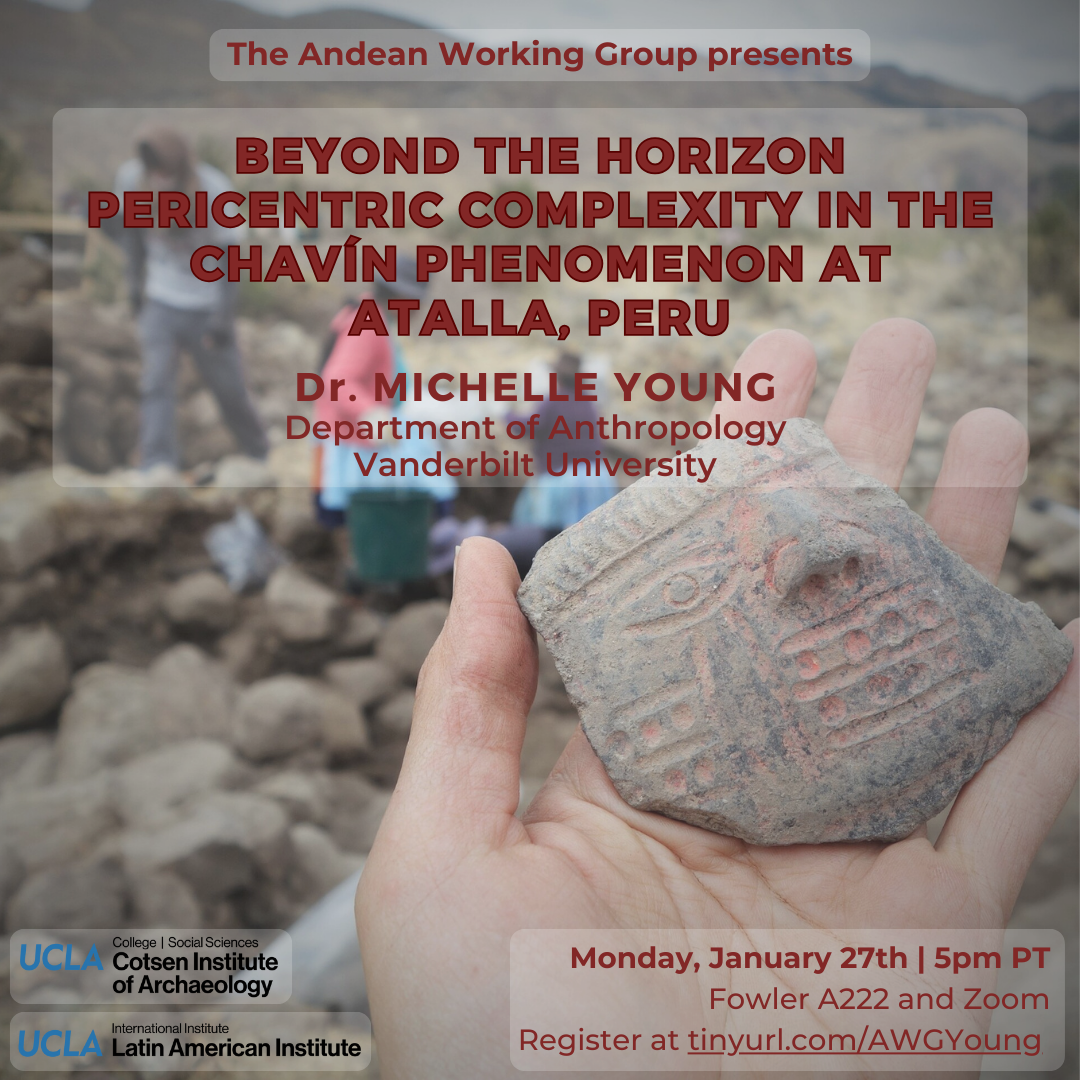
Registration is required for in-person and virtual participation.
Register at tinyurl.com/AWGYoung
This event is co-sponsored by the UCLA Latin American Institute and the Cotsen Institute of Archaeology.
Contact Gabriel Silva Collins
Email gsilvacollins@g.ucla.edu
Phone
ABSTRACT: An imperial document (chrysobull), issued in 1289 by Byzantine Emperor Andronikos II Palaiologos, confirms the privileges granted to a monastic foundation known as the Merciful Virgin in Phanari, Karditsa. The monastery was established by the sebastokratorissa Hypomone, a nun of Vlach origin who came from the transhumant nomadic group that moved between the Pindos Mountains and the Thessalian plateau. While only fragments of her monastic foundation survive today, this imperial document, read together with material evidence, offers insights into the overlapping landscapes between lowlands and uplands in the thirteenth century.
BIO: Sofia is a PhD candidate in the Department of Art History at UCLA. Her dissertation, “The Pindos Mountains: Land, Art, Community (13th-15th centuries),” explores how mountainous communities interacted with land by analyzing settlement and mobility patterns and artistic and social interactions across mountains and surrounding plains. She has received fellowships from the CMRS Center for Early Global Studies, the UCLA Stavros Niarchos Center for Hellenic Studies, Dumbarton Oaks, and the Mellon Foundation. She is the co-editor of the catalogue Weaving Dreams: Kilims from Geraki, Laconia, and has published articles on medieval soundscapes and communities.
Contact Sumiji Takahashi
Email sutakahashi@ioa.ucla.edu
Phone 310-825-4169
The statue-stelae of Early Iron Age Daunia (north Apulia, Italy), a group of stone slabs, are each incised to represent the garb and accoutrements of a person. They detail the clothing and adornment worn by men and women in full regalia, plus, through additional figurative images drawn on the robes, show ritual practices, everyday activities, and scenes of local legend. As such, they offer an unparalleled window into the lives of a proto-historic people, providing a rich source of self-representation for what is otherwise a fairly poorly understood society. Grounded in the scholarship of post-colonial and gender archaeology, this book pays full respect to the agency of indigenous communities and the important role of women. It considers the stelae not through a Hellenic lens, but in the Italo-Adriatic context to which they belong. This is the first time an in-depth, holistic study of the Daunian stelae has been undertaken, and the first presentation of the material in English.
6pm Lecture
7pm Reception
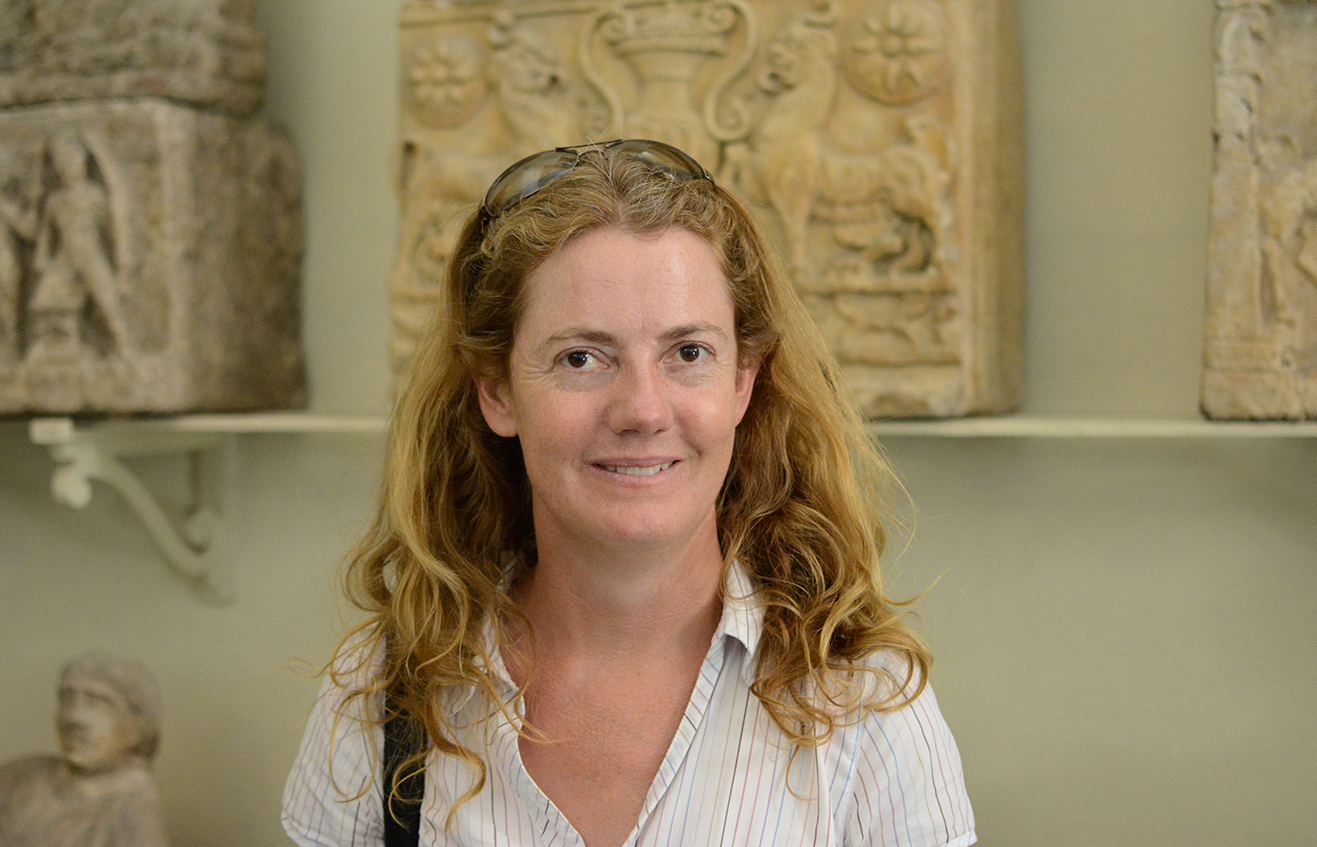
Camilla Norman is an archaeologist based at the University of Sydney whose particular interest is the Early Iron Age central Mediterranean. She was for many years the Project Officer of the Australian Archaeological Institute at Athens and has held post-doctoral positions in Italy (The British School in Rome) and England (The Institute of Cultural Studies, London University). She has worked on sites throughout central and southern Italy, mainland Greece, Jordon and Australia, as an excavator, illustrator and finds specialist.
Contact Michelle Jacobson
Email mjacobson@ioa.ucla.edu
Phone
Andean Working Group is pleased to announce Dr. Vladimir Gil Ramón's talk titled "Andean Environmental Conflicts, Risks, Disaster, and Development in the Anthropocene." Dr. Gil Ramón is a faculty member in the Department of Social Sciences and Environmental Development Master's Program at PUCP (Pontificia Universidad Católica del Perú). His research explores relationships between mining industries, the nation-state, and environmental risk, with publications including the 2020 book Fighting for Andean Resources. This AWG talk is an event rescheduled from its original Spring 2024 date.
If you would like to attend this event, please register at the following link: https://tinyurl.com/yc85rb6w
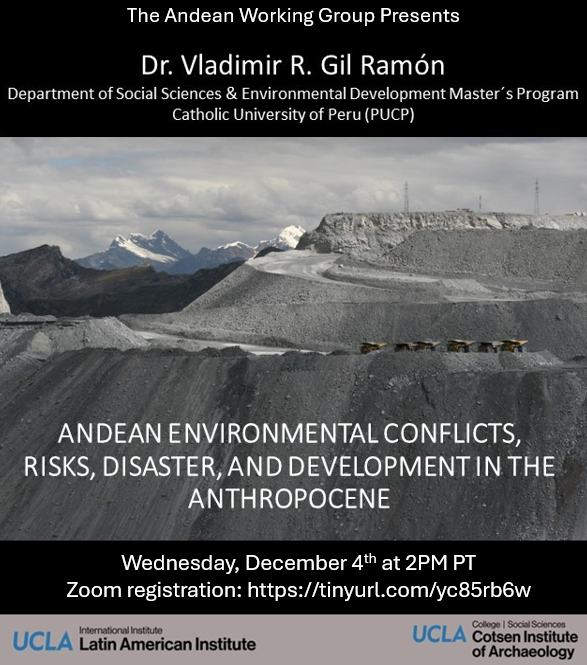
Contact Gabriel Silva Collins
Email gsilvacollins@g.ucla.edu
Phone

ABSTRACT: In 2023, the Cotsen Institute of Archaeology debuted its new graduate certificate in Cultural Heritage Research, Stewardship, and Restitution as part of the Waystation Initiative, which organizes and facilitates ethical returns of international archaeological and ethnological objects to the nation or community of origin. In this presentation, Lucha Martinez de Luna, Maryan Ragheb, and Mary Anastasi share the results from their first year working with Waystation. By combining provenance and art historical research with material analysis, they were able to compile object histories for various cultural objects from ancient China to reconstruct the life history of these objects. In the future, these and other cultural heritage artifacts will be returned to Shandong University in China, accompanied by provenance information obtained through our work with the Waystation. .
BIOS: Mary Anastasi is a PhD candidate in the Classics department at UCLA. Her research interests include philosophy, rhetoric, Imperial Greek literature, and epistolography, and she regularly teaches courses in Classics and Ancient Greek. Mary completed the Waystation certificate in the spring of 2024.
Lucha Martinez de Luna is an a PhD candidate in archaeology at the Cotsen Institute of Archaeology focused on Mesoamerican and Contemporary Archaeology. She has participated in archaeological projects in the Southwestern U.S., the American West, and central and southern Mexico and curator of archaeological and historical museum collections. As the La Providencia Archaeological Project director and a visiting professor at the University of Science and Arts in Chiapas, Mexico, Lucha also leads the Chicano/a/x Murals of Colorado Project.
Maryan Ragheb is a PhD candidate in archaeology at the Cotsen Institute of Archaeology who works in ancient Egypt. Her dissertation addresses people’s interactions with their material culture during social change in ancient Egypt, focusing on body ornamentation production and practices. Maryan worked on different archaeological projects in Egypt and Ethiopia. For the Waystation Certificate Program, she worked on jade neolithic objects from China.
Contact Sumiji Takahashi
Email sutakahashi@ioa.ucla.edu
Phone 310-825-4169
The Architecture Working Group presents Earthen Architecture and Heritage Conservation: Case Studies from Spain with Camilla Mileto and Fernando Vegas López-Manzanares, Getty Conservation Institute Fellows, Professors of Architecture and Historic Preservation at the Universitat Politéchnica de València (UPV).
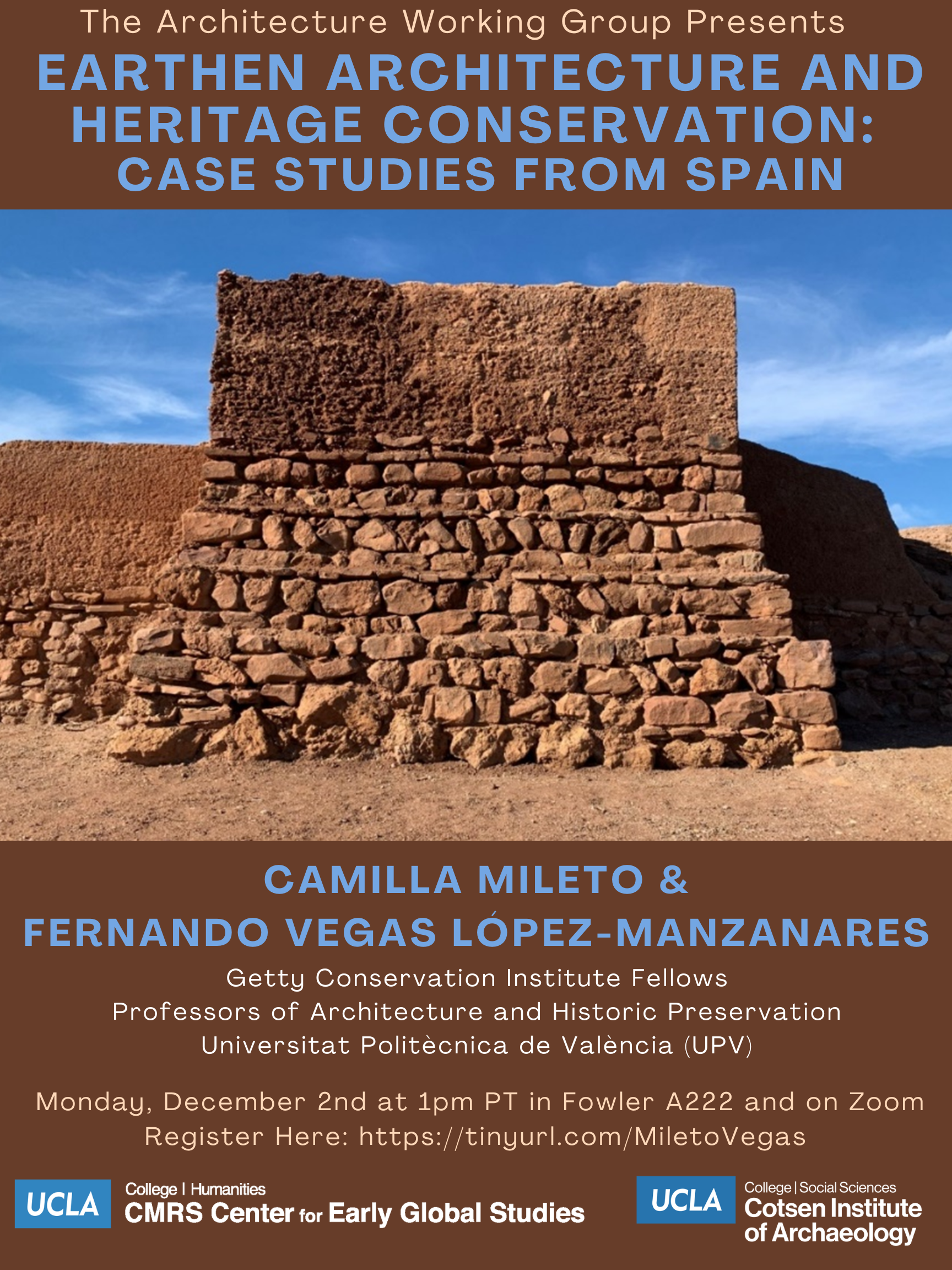
Contact Rachel Schloss
Email rachelschloss@g.ucla.edu
Phone
- ‹ previous
- 3 of 49
- next ›



